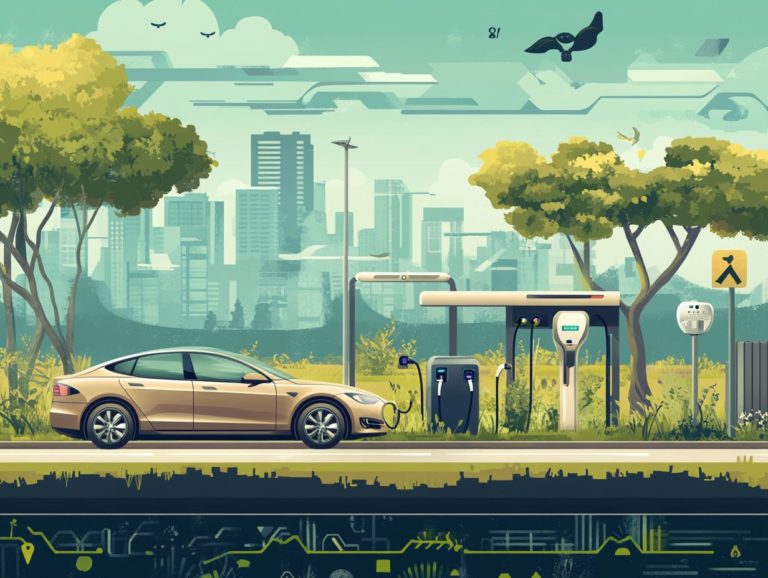Feature Comparison Between Gas and Diesel Engines
Knowing the differences between diesel and gasoline engines can transform your vehicle performance! This guide dives into key aspects, including power and performance, fuel efficiency ratings, and maintenance costs.
We ll also explore the environmental impact of each engine type and the availability of their fuels. By the end, you ll have the insights needed to make the right choice for your needs.
Contents
- Key Takeaways:
- Explanation of Different Engine Types
- Power and Performance
- Comparison of Horsepower and Torque
- Fuel Efficiency
- Costs and Maintenance
- Environmental Impact
- Availability and Accessibility
- Choosing the Right Engine for Your Needs
- Frequently Asked Questions
- What are the main differences between gas and diesel engines?
- Which type of engine is better for towing?
- What is the main advantage of a gas engine over a diesel engine?
- Which type of engine is more environmentally friendly?
- Which type of engine is better for long-distance driving?
- Can you convert a gas engine to a diesel engine or vice versa?
Key Takeaways:
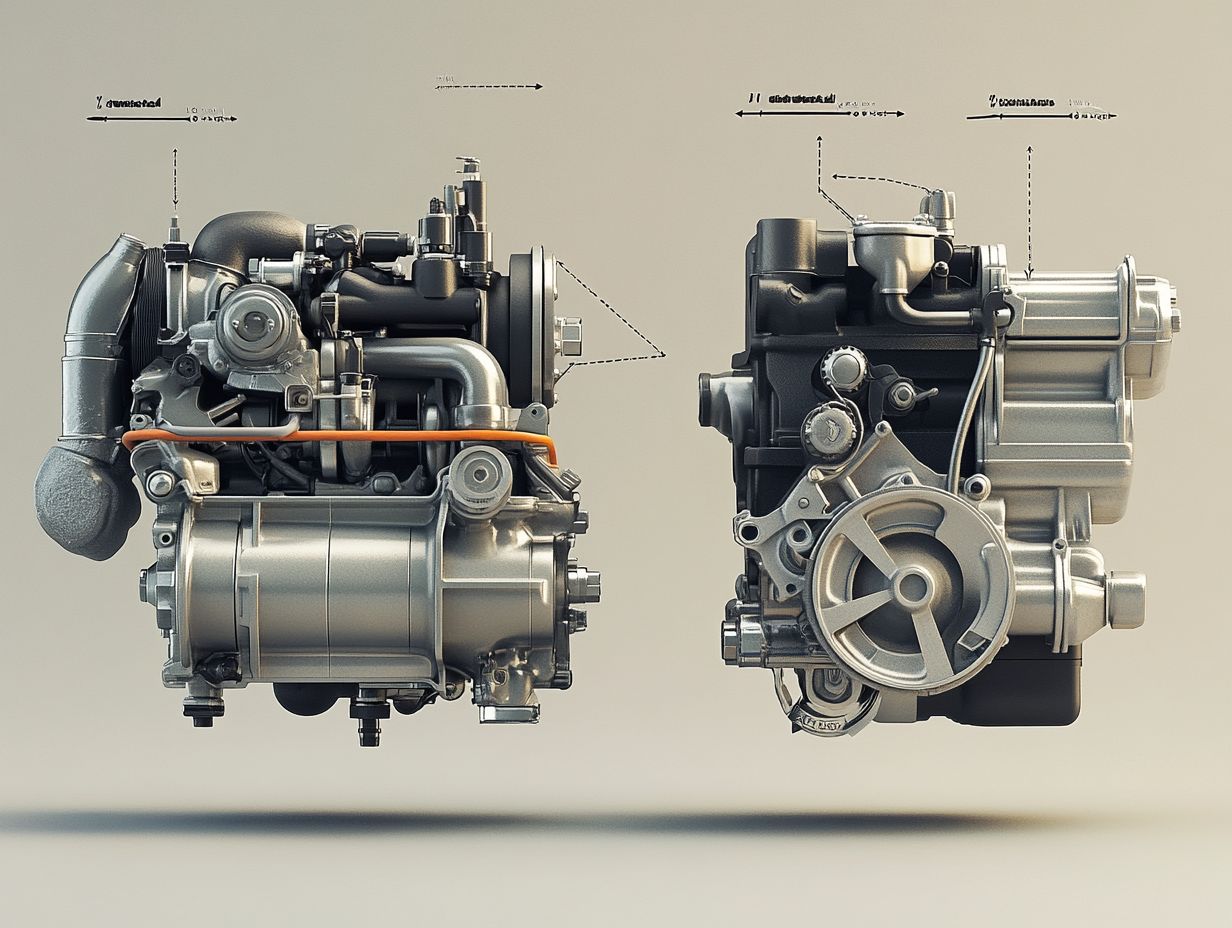
- Gas engines offer higher horsepower and acceleration, while diesel engines provide better torque and towing capabilities.
- Diesel engines offer higher fuel efficiency and lower long-term maintenance costs; however, gas engines typically have a lower initial cost and are more accessible.
- Regarding environmental impact, diesel engines are subject to stricter emissions regulations, but both gas and diesel engines have their own environmental considerations.
Explanation of Different Engine Types
Understanding the differences between diesel and gasoline engines is vital for optimizing your vehicle s performance and fuel efficiency. Diesel engines, created by Rudolf Diesel, are known for their durability and impressive torque. In contrast, gasoline engines excel in horsepower and smoother combustion.
Each engine type has unique traits that determine their use in vehicles like the Chevrolet Silverado and heavy-duty models, catering to various driving styles and industry needs.
Diesel engines operate using compression ignition, where air is compressed to ignite fuel, leading to greater fuel efficiency and longevity. Gasoline engines, however, use spark ignition, allowing for quicker acceleration. Diesel engines can achieve efficiency ratings exceeding gasoline engines by up to 30%.
This efficiency, combined with modern engineering, has made diesel engines a top choice in the commercial sector, especially in trucks and buses. Conversely, gasoline engines are ideal for lighter vehicles and performance cars.
Maintenance needs also vary significantly. Diesel engines often require more frequent oil changes and specialized care due to their higher operating pressures. Knowing these differences can greatly influence both your driving experience and long-term costs.
Power and Performance
Power and performance are critical attributes that shape engine capabilities, especially regarding horsepower and torque. The balance between these two factors significantly impacts vehicle performance, whether you are considering a diesel engine known for its torque or a gasoline engine recognized for horsepower.
Understanding these elements allows automotive technicians and enthusiasts to appreciate how various engines cater to a wide range of driving styles and applications, from everyday transportation to heavy-duty construction and agriculture.
Comparison of Horsepower and Torque
Horsepower and torque are essential metrics for evaluating engine performance. Horsepower is often associated with speed, while torque indicates the engine’s pulling power. Diesel engines typically excel in torque, making them the preferred choice for heavy-duty applications, while gasoline engines generally offer higher horsepower for better acceleration.
This distinction is crucial when choosing the right vehicle for your needs. For instance, a pickup truck with a turbocharged diesel engine can tow heavy loads efficiently thanks to its superior torque, making it ideal for construction or agricultural tasks.
On the other hand, a sports car like the Mazda MX-5 focuses on horsepower for quick acceleration and agility on winding roads.
By grasping these metrics, you can confidently choose a vehicle that meets your performance needs, whether prioritizing towing power or the thrill of speed.
Ready to choose the right engine type for you? Let s dive deeper!
Fuel Efficiency
Fuel efficiency is a crucial factor for vehicle owners, influencing both running costs and environmental sustainability.
Diesel engines are frequently praised for their exceptional energy content in fuel, allowing them to achieve better fuel economy rates than gasoline engines, especially in heavy-duty and commercial scenarios.
It s important to recognize that factors such as fuel viscosity and diligent engine maintenance significantly contribute to optimizing this efficiency and extending the engine s lifespan.
Efficiency Ratings and Factors Affecting Fuel Economy
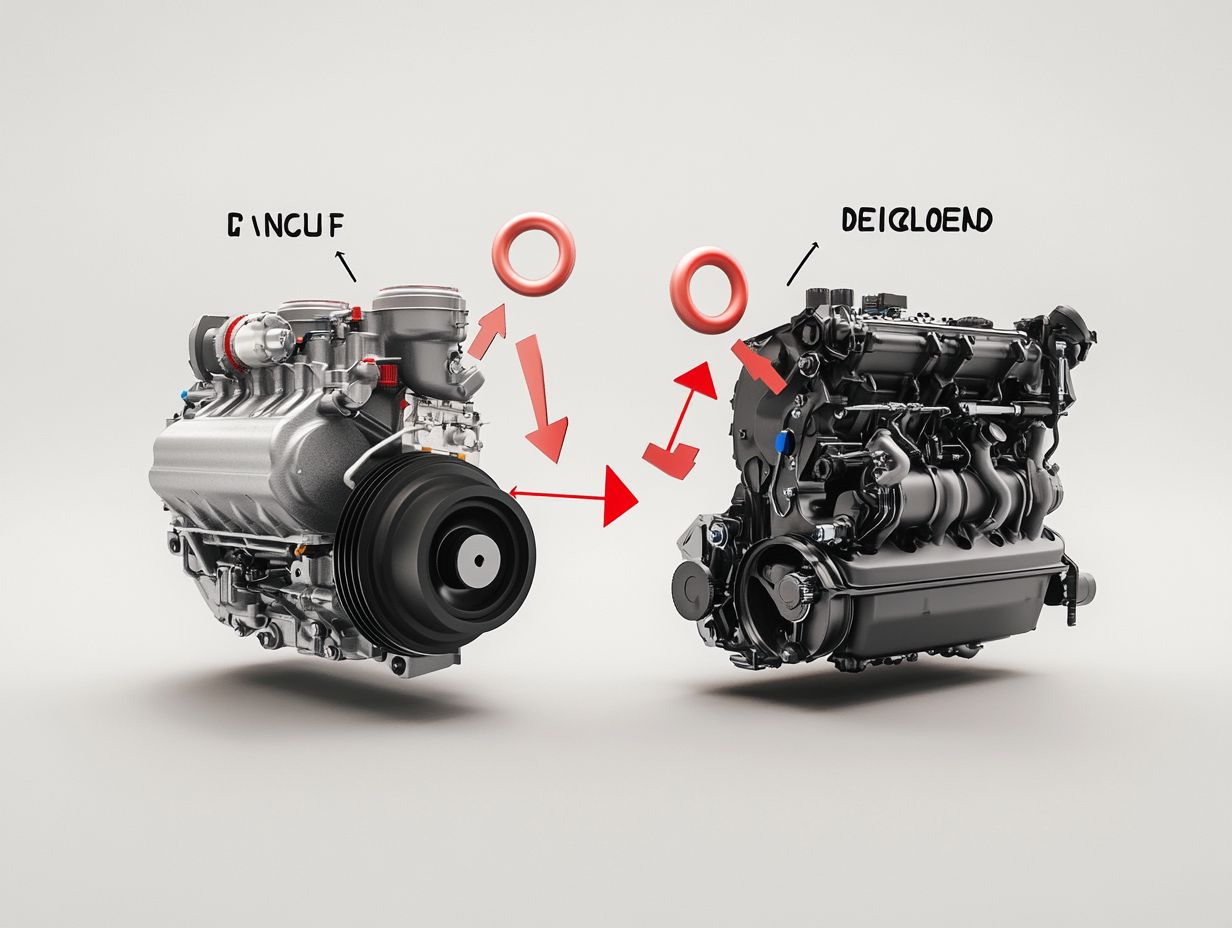
Efficiency ratings are essential for making informed decisions about fuel economy. These ratings can be affected by factors like your driving habits and the type of engine in your vehicle.
If you’re considering diesel fuel, you ll likely find it offers better fuel efficiency than gasoline, particularly in heavy-duty vehicles. This is why many industries with high operational demands prefer diesel.
When evaluating these ratings, keep in mind that your driving style plays a key role. Aggressive acceleration, sudden braking, and excessive idling can negatively impact fuel consumption. In contrast, steady driving at moderate speeds enhances efficiency.
Regular vehicle maintenance is also essential. Monitoring tire pressure and scheduling timely oil changes ensures your engine runs optimally, further boosting efficiency ratings.
For long-distance hauling, the torque characteristics of diesel engines can be particularly beneficial. They allow you to handle loads effectively without sacrificing fuel economy. This makes diesel-powered vehicles especially appealing for those in logistics and transportation, where every drop of fuel counts towards operational efficiency.
Costs and Maintenance
Understanding the costs and maintenance of different engines is key for vehicle owners. The initial investment and ongoing expenses can differ significantly.
While diesel engines typically involve a higher upfront cost, they often prove more economical over time due to their durability and efficiency. Gasoline engines may have a more attractive initial price tag but can lead to higher maintenance costs later.
Grasping these dynamics helps you make more informed decisions.
Initial Cost and Long-Term Expenses
When evaluating vehicles, consider both the initial cost and long-term expenses especially when comparing diesel trucks to gasoline-powered vehicles or used cars.
Diesel trucks might have a higher price upfront, but their durability and lower maintenance costs can lead to substantial savings over time.
For instance, a diesel truck could cost about $3,000 to $5,000 more than its gasoline counterpart, yet it often delivers fuel efficiency that outshines traditional fuel-powered options.
Diesel engines can achieve impressive 20-30% better fuel economy, translating into noticeable savings at the pump. Additionally, diesel vehicles generally require fewer oil changes and have longer intervals between maintenance visits.
Research shows that diesel truck owners can save up to $1,500 on repair costs over the vehicle’s lifetime. This makes the initial investment increasingly worthwhile, especially for those who frequently travel long distances or need reliable towing capacity.
Environmental Impact
The environmental impact of different engine types is a critical factor in today s automotive landscape, primarily influenced by emissions and regulatory standards.
While diesel engines offer superior fuel efficiency, they have historically emitted higher levels of nitrogen oxides pollutants that can affect air quality and particulates. This has led to stricter emissions regulations for diesel vehicles.
Conversely, gasoline engines have benefited from advancements in combustion technologies, allowing them to reduce their environmental footprint and comply more easily with evolving standards.
What s your experience with diesel vs. gasoline engines?
Emissions and Environmental Regulations
Emissions from vehicles are heavily regulated by environmental laws. Diesel fuel faces stricter emissions standards. This means it needs advanced filtration systems and cleaner combustion chambers. Gasoline engines also face changing environmental regulations.
Diesel engines are efficient and provide great torque. They require complex technologies like selective catalytic reduction (SCR), a system that helps reduce harmful emissions, and diesel particulate filters (DPF) to effectively minimize nitrogen oxides and particulate matter. Gasoline engines are now using direct fuel injection and turbocharging technologies to improve fuel efficiency and reduce carbon monoxide and hydrocarbons.
Consider the advent of onboard diagnostics (OBD) systems, which have become essential for both engine types. These systems ensure compliance through real-time monitoring and adjustments. As the regulatory framework tightens, manufacturers face the challenge of innovating to meet existing standards while also preparing for future emissions hurdles.
Availability and Accessibility
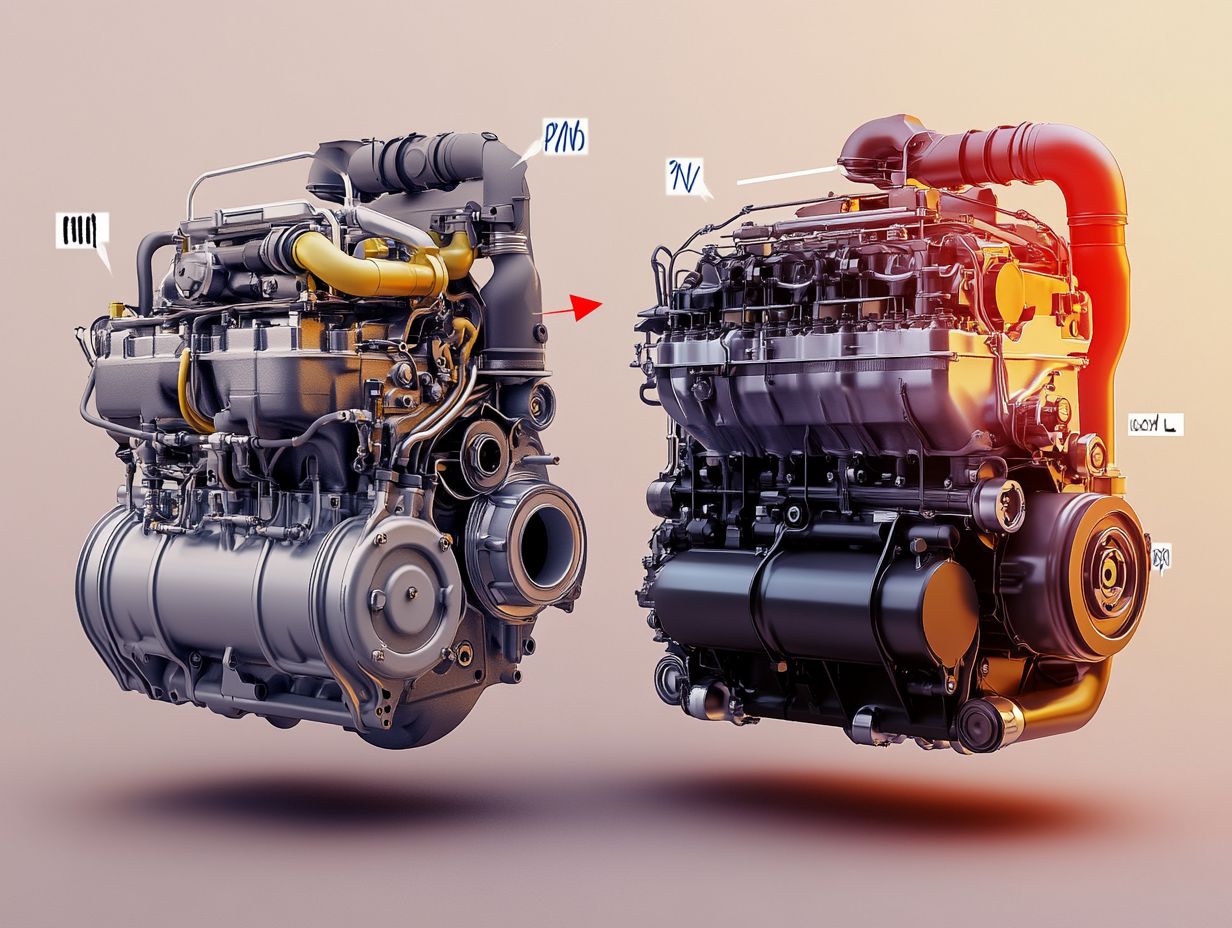
The availability and accessibility of various fuel types play a crucial role in shaping your choices as a consumer, especially when weighing diesel against gasoline options. Gasoline is typically abundant in most areas, providing convenience for drivers.
In contrast, the availability of diesel can differ significantly from one region to another. This inconsistency influences fuel prices and ultimately affects the operating costs for those who depend on diesel engines. It s essential to consider these factors when selecting your fuel source.
Availability of Gas and Diesel Fuel
Fuel availability can change dramatically based on your location! In busy cities, you ll find gas stations everywhere, while diesel might be harder to find, especially in certain states or rural settings.
This inconsistency largely stems from the transportation infrastructure. Recent statistics show that urban centers typically enjoy a higher density of gas stations. Some locations boast up to 30% more availability compared to rural counterparts. Conversely, rural regions often face long journeys to reach the nearest diesel supply, making their supply chains vulnerable to disruptions.
Current market trends highlight how fluctuations in crude oil prices complicate this situation. Consumers in less accessible areas confront higher fuel costs as a result. These regional differences significantly impact your daily commute and the logistics of moving goods throughout the economy.
Choosing the Right Engine for Your Needs
Selecting the ideal engine type for your needs requires careful consideration of several factors, including performance, fuel efficiency, and your personal preferences. Each element can impact your vehicle’s safety and your overall satisfaction.
Whether you lean towards a diesel engine, known for its torque and durability, or a gasoline engine, praised for its acceleration and smoother operation, understanding these aspects is essential for making a well-informed choice.
Factors to Consider and Personal Preferences
When choosing the right engine for your vehicle, consider your personal preferences and driving habits. Repair needs also play a significant role in your choice between diesel and gasoline engines.
For instance, if you frequently navigate urban environments, you might prioritize a smaller, fuel-efficient gasoline engine. Its responsive acceleration can make weaving through traffic a breeze.
On the other hand, if you rely on your vehicle for towing heavy loads perhaps a boat or a trailer you may find yourself leaning towards a robust diesel engine, celebrated for its impressive torque, which is the twisting force that helps your vehicle move, and durability under strain.
Keep in mind that long-term maintenance can vary greatly between engine types. Diesel engines usually need more specialized care but last longer. Meanwhile, gasoline engines are often simpler and cheaper to repair.
Understanding these differences can empower you to choose the perfect engine for your needs today and in the future!
Frequently Asked Questions
What are the main differences between gas and diesel engines?
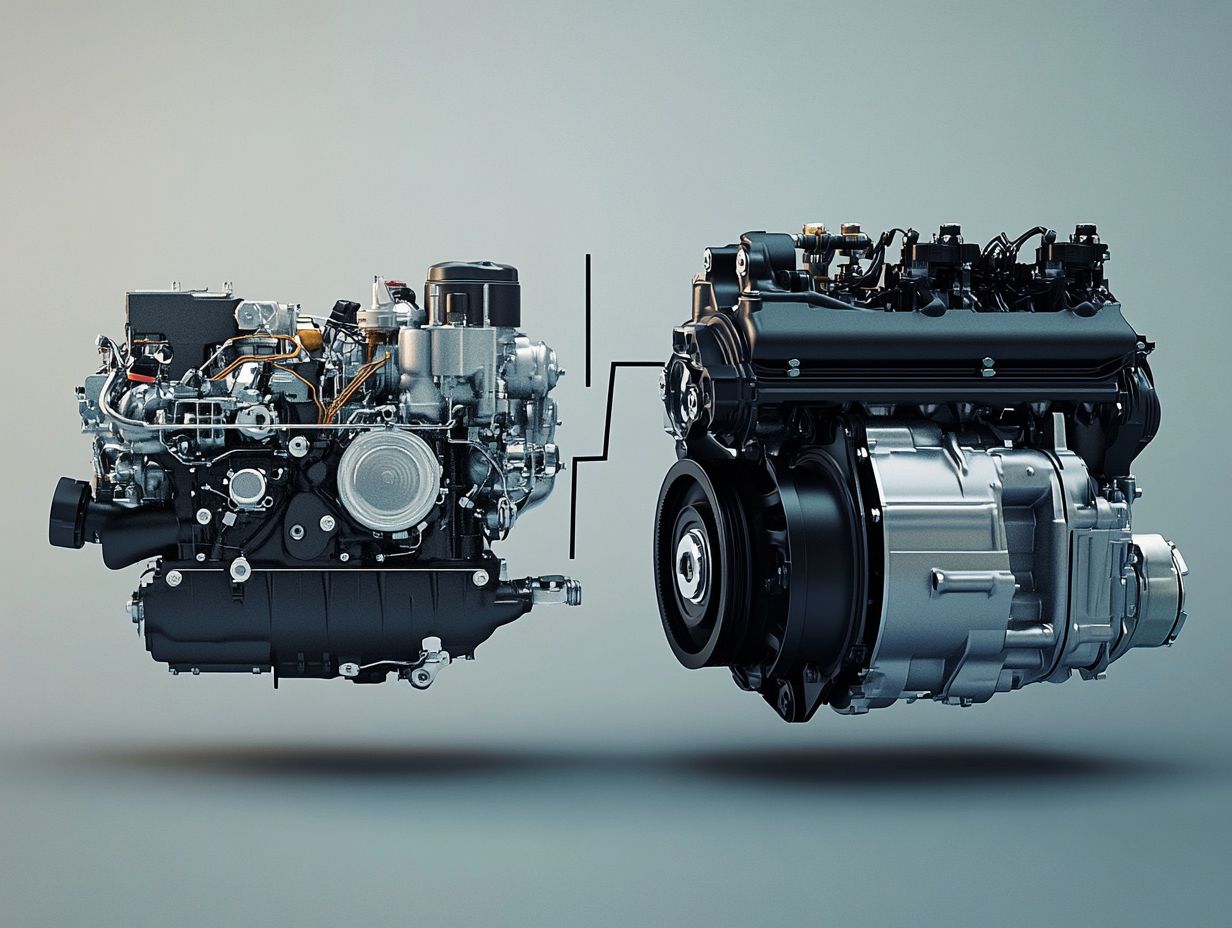
Gas and diesel engines have several key differences, including the type of fuel used, the combustion process, and the power output. Gas engines use gasoline as fuel and ignite it with a spark, while diesel engines use diesel fuel and compress the air-fuel mixture to ignite it. Gas engines are typically more fuel-efficient and have higher horsepower, but diesel engines have better torque and are more durable.
Which type of engine is better for towing?
Diesel engines are generally better for towing due to their high torque output, which allows them to pull heavy loads with ease. Gas engines, on the other hand, may struggle to tow heavy loads and may require more frequent breaks to prevent overheating.
What is the main advantage of a gas engine over a diesel engine?
The main advantage of a gas engine is its lower cost, both in terms of initial purchase price and maintenance. Gasoline is also more widely available and less expensive than diesel fuel in most areas.
Which type of engine is more environmentally friendly?
Overall, diesel engines are considered more environmentally friendly due to their higher fuel efficiency and lower carbon emissions. However, modern gas engines have also significantly improved in terms of emissions and can be a more environmentally-friendly option if regularly maintained and driven efficiently.
Which type of engine is better for long-distance driving?
Diesel engines are typically better for long-distance driving due to their fuel efficiency and longer lifespan. They are designed for heavy-duty use and can withstand the high mileage and constant driving that comes with long-distance trips.
Can you convert a gas engine to a diesel engine or vice versa?
No, it is not possible to convert a gas engine to a diesel engine or vice versa. The two types of engines have completely different designs and components, and attempting to convert one to the other would require significant modifications and may not be practical or cost-effective.

